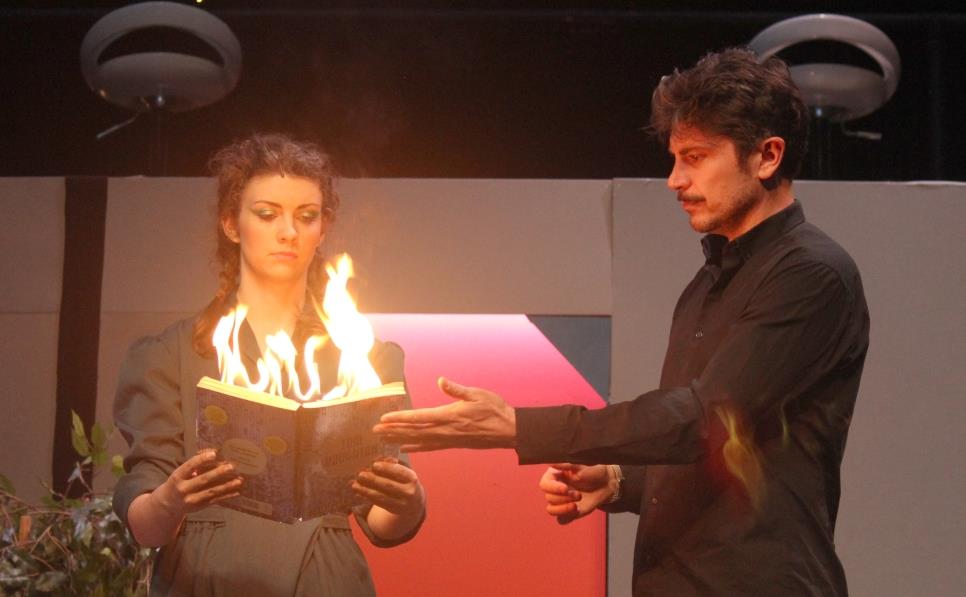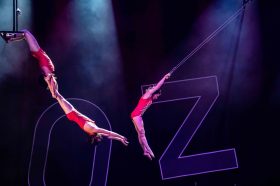When magic is featured in a live show, the need for precision stagecraft becomes paramount.
The science-fiction comedy The Chronicles of the SS Regent features a sailing ship in outer space, a ship’s captain who can fly, levitating fridges, disappearing doors and flames on stage. And it demands coordination, attention to detail and the very best technical skills.
Performing these impressive illusions also raises safety issues for the cast and crew. Learning a professional approach to technical theatre and stage management in this environment is crucial.
‘Magic is very challenging and there is a lot of stagecraft involved to get it right,’ said professional magician and illusionist Adam Mada. ‘Every illusion you see is a micro-study in every aspect – stage management, lighting design, sound design, special effects – all coming together.’
This year Mada joined the teaching team at NIDA as guest tutor in the Bachelor of Fine Arts Technical Theatre and Stage Management (BFA TTSM). He is also in demand as an illusions consultant working with many high-profile productions, including Harry Potter and the Cursed Child in Melbourne and the touring production of Possum Magic.
Mada said there was a lot of crossover between his involvement with NIDA and his professional work. ‘Many of the people working on Harry Potter and Possum Magic came through this course.’
Students in NIDA’s BFA TTSM get hands-on stage experience as they learn innovative ways to manage and integrate technical fields within theatres, concerts and events. They are now working with Mada on the new devised production of The Chronicles of the SS Regent.
‘I’m heavily involved with the students, working on their shows,’ he said. ‘Whenever you see an illusion on stage, there is a big stage management team behind-the-scenes doing all the work to make it happen.’
Mada said it was vital that the technical teams understand how the illusions in a show work if they are to be performed safely and look convincing to the audience.
The three-year full-time BFA TTSM prepares students for a career behind-the-scenes in roles such as theatre-maker, stage manager, production manager, lighting and sound designer, and theatrical technician. It is designed for students with a passion for the theatre and a desire to make work at the highest level.
‘Our graduates form the backbone of most stage management, lighting, and sound and production management teams around the country,’ said Graham Henstock, director of NIDA’s Centre for Technology, Production and Management. ‘They can be found working in theatre and musicals, at arts festivals, with state theatre companies, and on major events.’
He said the course looked for people who were passionate about making theatre, with a specific interest in working behind-the-scenes. ‘They need to be creative thinkers, problem-solvers, and excited by the prospect of collaborating with others to make astounding art,’ said Henstock.
The BFA TTSM is an immersive, practice-based course giving students the hands-on skills to be successful as technical theatre and stage management practitioners.
A key feature of the course is the active involvement of guest lecturers like Adam Mada who are established professionals and leaders in the creative and cultural industries. Their vast expertise gives students the skills and knowledge to build their careers and gives them the confidence to follow their dreams.
In second year the BFA TTSM students visit the Adelaide Festival and Adelaide Fringe for a marathon of theatre-going, attending around thirty productions in ten days. And in third year, the course culminates with an industry placement of at least 10 weeks. This gives students the real-world experience that is essential to their future employability and lays the foundations of a sustainable career in the arts.
Students have undertaken placements with theatre, dance and opera production companies, event managers, and arts festivals across the country. International placements are also available such as with the House of Dancing Water in Macau, the Brooklyn Academy of Music in New York, and the Royal Edinburgh Military Tattoo in Scotland.
Many BFA TTSM graduates are now working with prestigious companies such as Sydney Theatre Company, Bangarra Dance Theatre, Melbourne Theatre Company, Opera Australia, The Australian Ballet and Cirque du Soleil.
‘We only take around 15 students per year. This means that the tutor-to-student ratio is very high and it allows us to really focus on the individual needs of each student,’ said Henstock. ‘We treat all of our students as artists. They need to be passionate about being part of the collaborative art-form of theatre making, even if the skills they bring to that art-form are technical or managerial in nature.’
Applications for the 2020 intake of the BFA TTSM close on 30 September 2019. Entry to the program is by interview and creative project.





